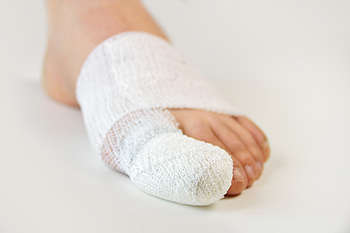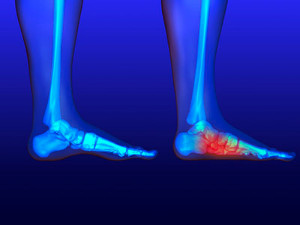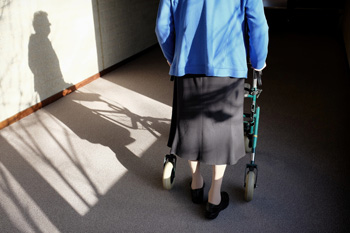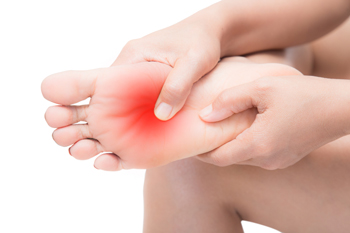February 2021
What Are the Symptoms of a Broken Toe?
 Patients who stub their toe against a piece of furniture, or drop a heavy object on it, may experience a broken toe. The average healing time for this type of injury is generally four to six weeks, and it is often accompanied by swelling and bruising. Additional symptoms can include severe pain and it may be difficult to put a shoe on and walk. Mild relief can be found if you have a mildly fractured toe by taping the affected toe to the toe next to it. This is referred to as buddy taping, and it is typically effective in providing the necessary stability to the affected toe as the healing process occurs. Severely broken toes may require that a cast be worn, and it can be helpful to use crutches to keep weight off of the toe. If you have fractured your toe, please consult with a podiatrist.
Patients who stub their toe against a piece of furniture, or drop a heavy object on it, may experience a broken toe. The average healing time for this type of injury is generally four to six weeks, and it is often accompanied by swelling and bruising. Additional symptoms can include severe pain and it may be difficult to put a shoe on and walk. Mild relief can be found if you have a mildly fractured toe by taping the affected toe to the toe next to it. This is referred to as buddy taping, and it is typically effective in providing the necessary stability to the affected toe as the healing process occurs. Severely broken toes may require that a cast be worn, and it can be helpful to use crutches to keep weight off of the toe. If you have fractured your toe, please consult with a podiatrist.
A broken toe can be very painful and lead to complications if not properly fixed. If you have any concerns about your feet, contact Dr. Ronald K. Olm from Grand Traverse Foot & Ankle Center. Our doctor will treat your foot and ankle needs.
What to Know About a Broken Toe
Although most people try to avoid foot trauma such as banging, stubbing, or dropping heavy objects on their feet, the unfortunate fact is that it is a common occurrence. Given the fact that toes are positioned in front of the feet, they typically sustain the brunt of such trauma. When trauma occurs to a toe, the result can be a painful break (fracture).
Symptoms of a Broken Toe
- Throbbing pain
- Swelling
- Bruising on the skin and toenail
- The inability to move the toe
- Toe appears crooked or disfigured
- Tingling or numbness in the toe
Generally, it is best to stay off of the injured toe with the affected foot elevated.
Severe toe fractures may be treated with a splint, cast, and in some cases, minor surgery. Due to its position and the pressure it endures with daily activity, future complications can occur if the big toe is not properly treated.
If you have any questions please feel free to contact one of our offices located in Traverse City and Kalkaska, MI . We offer the newest diagnostic and treatment technologies for all your foot and ankle needs.
Two Categories of Flat Feet
 Patients who are missing an arch in their foot have the condition that is known as flat feet. Flat feet fall into two categories. Flexible flat feet have an arch that disappears when the foot bears weight and reappears while sitting or standing on tiptoes. Rigid flat feet do not have an arch regardless of whether you stand or sit. Children that have flat feet may benefit from wearing soft insoles, and this may provide additional comfort. If your child has flat feet that are causing them discomfort, it is suggested that you confer with a podiatrist who can offer treatment options.
Patients who are missing an arch in their foot have the condition that is known as flat feet. Flat feet fall into two categories. Flexible flat feet have an arch that disappears when the foot bears weight and reappears while sitting or standing on tiptoes. Rigid flat feet do not have an arch regardless of whether you stand or sit. Children that have flat feet may benefit from wearing soft insoles, and this may provide additional comfort. If your child has flat feet that are causing them discomfort, it is suggested that you confer with a podiatrist who can offer treatment options.
Flatfoot is a condition many people suffer from. If you have flat feet, contact Dr. Ronald K. Olm from Grand Traverse Foot & Ankle Center. Our doctor will treat your foot and ankle needs.
What Are Flat Feet?
Flatfoot is a condition in which the arch of the foot is depressed and the sole of the foot is almost completely in contact with the ground. About 20-30% of the population generally has flat feet because their arches never formed during growth.
Conditions & Problems:
Having flat feet makes it difficult to run or walk because of the stress placed on the ankles.
Alignment – The general alignment of your legs can be disrupted, because the ankles move inward which can cause major discomfort.
Knees – If you have complications with your knees, flat feet can be a contributor to arthritis in that area.
Symptoms
- Pain around the heel or arch area
- Trouble standing on the tip toe
- Swelling around the inside of the ankle
- Flat look to one or both feet
- Having your shoes feel uneven when worn
Treatment
If you are experiencing pain and stress on the foot you may weaken the posterior tibial tendon, which runs around the inside of the ankle.
If you have any questions please feel free to contact one of our offices located in Traverse City and Kalkaska, MI . We offer the newest diagnostic and treatment technologies for all your foot and ankle needs.
Heel Pain Can Be Treated!
Important Keys for Senior Foot Care
 As the feet get older, they can become worn down from years of supporting the body. The skin becomes less elastic, which can lead to issues such as blisters and cracked heels. Because of the complexity of issues that can arise, wearing the right footwear is one of the most important factors in caring for your feet. Shoes should have a proper grip and gently hug the feet. Keeping the feet clean, warm, and dry is important as well in order to prevent an infection. The toenails should be cut short and straight across in order to prevent ingrown toenails. Any issues with the feet should be checked by a podiatrist in order to prevent them from getting worse. This includes any sores or other abnormalities. A podiatrist will also be able to provide other recommendations on how to care for your feet.
As the feet get older, they can become worn down from years of supporting the body. The skin becomes less elastic, which can lead to issues such as blisters and cracked heels. Because of the complexity of issues that can arise, wearing the right footwear is one of the most important factors in caring for your feet. Shoes should have a proper grip and gently hug the feet. Keeping the feet clean, warm, and dry is important as well in order to prevent an infection. The toenails should be cut short and straight across in order to prevent ingrown toenails. Any issues with the feet should be checked by a podiatrist in order to prevent them from getting worse. This includes any sores or other abnormalities. A podiatrist will also be able to provide other recommendations on how to care for your feet.
Proper foot care is something many older adults forget to consider. If you have any concerns about your feet and ankles, contact Dr. Ronald K. Olm from Grand Traverse Foot & Ankle Center. Our doctor can provide the care you need to keep you pain-free and on your feet.
The Elderly and Their Feet
As we age we start to notice many changes in our body, but the elder population may not notice them right away. Medical conditions may prevent the elderly to take notice of their foot health right away. Poor vision is a lead contributor to not taking action for the elderly.
Common Conditions
- Neuropathy – can reduce feeling in the feet and can hide many life-threatening medical conditions.
- Reduced flexibility – prevents the ability of proper toenail trimming, and foot cleaning. If left untreated, it may lead to further medical issues.
- Foot sores – amongst the older population can be serious before they are discovered. Some of the problematic conditions they may face are:
- Gouging toenails affecting nearby toe
- Shoes that don’t fit properly
- Pressure sores
- Loss of circulation in legs & feet
- Edema & swelling of feet and ankles
Susceptible Infections
Diabetes and poor circulation can cause general loss of sensitivity over the years, turning a simple cut into a serious issue.
If you have any questions please feel free to contact one of our offices located in Traverse City and Kalkaska, MI . We offer the newest diagnostic and treatment technologies for all your foot and ankle needs.
Can Neuropathy Be Inherited?
 Peripheral neuropathy is the result of nerve damage that occurs in the extremities such as the hands and feet. When this peripheral neuropathy is inherited, it is known as Charcot-Marie-Tooth, or CMT. Charcot-Marie-Tooth affects people worldwide. While CMT is not life threatening, it does lead to the loss of mobility and function in the extremities as the nerves degenerate. There are many different genetic causes for CMT, but most cases have a variety of similar symptoms. These symptoms include having high arched feet, structural foot deformities and weakening of the muscles. Patients who are suffering from CMT should consult with a podiatrist for treatment options that can help improve function. Treatment options may include physical therapy, bracing, wearing properly fitting footwear, and maintaining a healthy weight.
Peripheral neuropathy is the result of nerve damage that occurs in the extremities such as the hands and feet. When this peripheral neuropathy is inherited, it is known as Charcot-Marie-Tooth, or CMT. Charcot-Marie-Tooth affects people worldwide. While CMT is not life threatening, it does lead to the loss of mobility and function in the extremities as the nerves degenerate. There are many different genetic causes for CMT, but most cases have a variety of similar symptoms. These symptoms include having high arched feet, structural foot deformities and weakening of the muscles. Patients who are suffering from CMT should consult with a podiatrist for treatment options that can help improve function. Treatment options may include physical therapy, bracing, wearing properly fitting footwear, and maintaining a healthy weight.
Neuropathy
Neuropathy can be a potentially serious condition, especially if it is left undiagnosed. If you have any concerns that you may be experiencing nerve loss in your feet, consult with Dr. Ronald K. Olm from Grand Traverse Foot & Ankle Center. Our doctor will assess your condition and provide you with quality foot and ankle treatment for neuropathy.
What Is Neuropathy?
Neuropathy is a condition that leads to damage to the nerves in the body. Peripheral neuropathy, or neuropathy that affects your peripheral nervous system, usually occurs in the feet. Neuropathy can be triggered by a number of different causes. Such causes include diabetes, infections, cancers, disorders, and toxic substances.
Symptoms of Neuropathy Include:
- Numbness
- Sensation loss
- Prickling and tingling sensations
- Throbbing, freezing, burning pains
- Muscle weakness
Those with diabetes are at serious risk due to being unable to feel an ulcer on their feet. Diabetics usually also suffer from poor blood circulation. This can lead to the wound not healing, infections occurring, and the limb may have to be amputated.
Treatment
To treat neuropathy in the foot, podiatrists will first diagnose the cause of the neuropathy. Figuring out the underlying cause of the neuropathy will allow the podiatrist to prescribe the best treatment, whether it be caused by diabetes, toxic substance exposure, infection, etc. If the nerve has not died, then it’s possible that sensation may be able to return to the foot.
Pain medication may be issued for pain. Electrical nerve stimulation can be used to stimulate nerves. If the neuropathy is caused from pressure on the nerves, then surgery may be necessary.
If you have any questions, please feel free to contact one of our offices located in Traverse City and Kalkaska, MI . We offer the newest diagnostic and treatment technologies for all your foot care needs.






